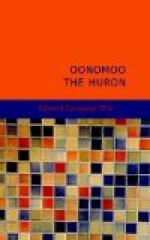The Indian lodges differed very little from each other, being of a rough, substantial character, built with an eye to comfort rather than beauty. One at the extreme northern edge of the village is that with which our story deals. A brief description of it will serve as a general daguerreotype of all those wild abodes.
The wigwam was composed of skins and bark, the latter greatly predominating. The shape was that of a cone. The framework was of poles, the lower ends of which were placed in a sort of circle, while the tops were intersected, leaving a small opening, through which the smoke reached the clear air above. Unsightly and repulsive as this might seem from the outside view, the dwelling, nevertheless, was water-proof and comfortable, and abundantly answered the end for which it was built.
A thin vapor was ascending in a bluish spiral at the top of the lodge indicated. A Shawnee squaw was occupied in preparing the morning meal, while her liege lord still reclined in one corner, in the vain effort to secure a few minutes more of slumber. This latter personage was Hans Vanderbum—our friend Hans—a huge, plethoric, stolid, lazy Dutchman, who had “married” an Indian widow several years before. At the time of her marriage this squaw had a boy some three or four years of age, while a second one, the son of the Dutchman, was now just large enough to be as mischievous as a kitten. They were a couple of greasy, copper-hued little rascals, with eyes as black as midnight, and long, wiry hair, like that of a horse’s mane. Brimful of animal spirits, they were just the reverse of Hans Vanderbum, whose laziness and stupidity were only excelled by his indifference to the dignity and rights of human nature.
Hans Vanderbum lay fiat upon his back, for the atmosphere of the wigwam was too warm for covering, his ponderous belly rising and falling like a wave of the sea, and his throat giving forth that peculiar rattling of the glottis, which might be mistaken for suffocation. The boys certainly would have been outside, basking in the genial sunshine, had not their mother, Keewaygooshturkumkankangewock, positively denied them that coveted privilege. The commands of the father might be trampled upon with impunity, but the young half-breeds knew better than to disobey their mother.
“Shtop dat noise! shtop dat noise!” repeated Hans, raising his head without stirring his body or limbs.
His broad face seemed all ablaze from its fiery red color, and the threatening fury throned upon his lowering forehead would almost have annihilated him who encountered it for the first time. As it was, the two boys suddenly straightened their faces, and assumed an air of meek penitence, as if suffering the most harrowing remorse for what they had done; and the father, after glaring at them a moment, as if to drive in and clinch the impression he had made, let his head drop back with a dull thump upon the ground, and again closed his eyes.




